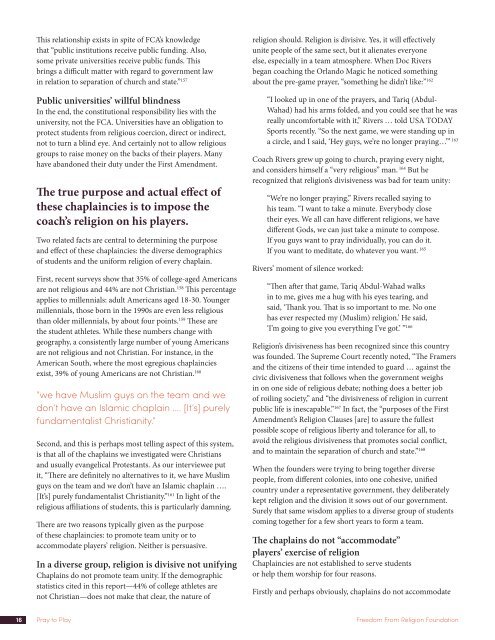Pray Play
PraytoPlay
PraytoPlay
Create successful ePaper yourself
Turn your PDF publications into a flip-book with our unique Google optimized e-Paper software.
This relationship exists in spite of FCA’s knowledgethat “public institutions receive public funding. Also,some private universities receive public funds. Thisbrings a difficult matter with regard to government lawin relation to separation of church and state.” 157Public universities’ willful blindnessIn the end, the constitutional responsibility lies with theuniversity, not the FCA. Universities have an obligation toprotect students from religious coercion, direct or indirect,not to turn a blind eye. And certainly not to allow religiousgroups to raise money on the backs of their players. Manyhave abandoned their duty under the First Amendment.The true purpose and actual effect ofthese chaplaincies is to impose thecoach’s religion on his players.Two related facts are central to determining the purposeand effect of these chaplaincies: the diverse demographicsof students and the uniform religion of every chaplain.First, recent surveys show that 35% of college-aged Americansare not religious and 44% are not Christian. 158 This percentageapplies to millennials: adult Americans aged 18-30. Youngermillennials, those born in the 1990s are even less religiousthan older millennials, by about four points. 159 These arethe student athletes. While these numbers change withgeography, a consistently large number of young Americansare not religious and not Christian. For instance, in theAmerican South, where the most egregious chaplainciesexist, 39% of young Americans are not Christian. 160“we have Muslim guys on the team and wedon’t have an Islamic chaplain …. [It’s] purelyfundamentalist Christianity.”Second, and this is perhaps most telling aspect of this system,is that all of the chaplains we investigated were Christiansand usually evangelical Protestants. As our interviewee putit, “There are definitely no alternatives to it, we have Muslimguys on the team and we don’t have an Islamic chaplain ….[It’s] purely fundamentalist Christianity.” 161 In light of thereligious affiliations of students, this is particularly damning.There are two reasons typically given as the purposeof these chaplaincies: to promote team unity or toaccommodate players’ religion. Neither is persuasive.In a diverse group, religion is divisive not unifyingChaplains do not promote team unity. If the demographicstatistics cited in this report—44% of college athletes arenot Christian—does not make that clear, the nature ofreligion should. Religion is divisive. Yes, it will effectivelyunite people of the same sect, but it alienates everyoneelse, especially in a team atmosphere. When Doc Riversbegan coaching the Orlando Magic he noticed somethingabout the pre-game prayer, “something he didn’t like:” 162“I looked up in one of the prayers, and Tariq (Abdul-Wahad) had his arms folded, and you could see that he wasreally uncomfortable with it,” Rivers … told USA TODAYSports recently. “So the next game, we were standing up ina circle, and I said, ‘Hey guys, we’re no longer praying…’” 163Coach Rivers grew up going to church, praying every night,and considers himself a “very religious” man. 164 But herecognized that religion’s divisiveness was bad for team unity:“We’re no longer praying,” Rivers recalled saying tohis team. “I want to take a minute. Everybody closetheir eyes. We all can have different religions, we havedifferent Gods, we can just take a minute to compose.If you guys want to pray individually, you can do it.If you want to meditate, do whatever you want. 165Rivers’ moment of silence worked:“Then after that game, Tariq Abdul-Wahad walksin to me, gives me a hug with his eyes tearing, andsaid, ‘Thank you. That is so important to me. No onehas ever respected my (Muslim) religion.’ He said,‘I’m going to give you everything I’ve got.’ ” 166Religion’s divisiveness has been recognized since this countrywas founded. The Supreme Court recently noted, “The Framersand the citizens of their time intended to guard … against thecivic divisiveness that follows when the government weighsin on one side of religious debate; nothing does a better jobof roiling society,” and “the divisiveness of religion in currentpublic life is inescapable.” 167 In fact, the “purposes of the FirstAmendment’s Religion Clauses [are] to assure the fullestpossible scope of religious liberty and tolerance for all, toavoid the religious divisiveness that promotes social conflict,and to maintain the separation of church and state.” 168When the founders were trying to bring together diversepeople, from different colonies, into one cohesive, unifiedcountry under a representative government, they deliberatelykept religion and the division it sows out of our government.Surely that same wisdom applies to a diverse group of studentscoming together for a few short years to form a team.The chaplains do not “accommodate”players’ exercise of religionChaplaincies are not established to serve studentsor help them worship for four reasons.Firstly and perhaps obviously, chaplains do not accommodate16 <strong>Pray</strong> to <strong>Play</strong> Freedom From Religion Foundation


